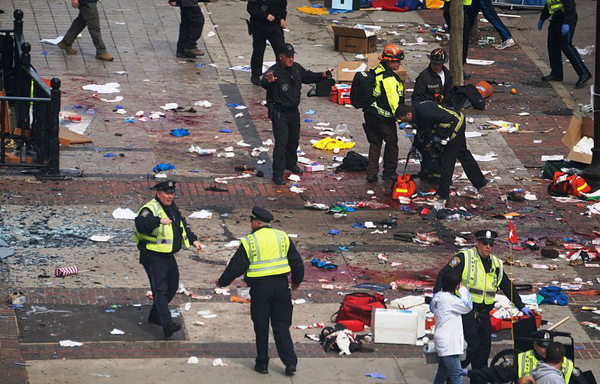Boston Marathon winner Lelisa Desisa of Ethiopia finished in two hours, 10 minutes and 22 seconds, just five seconds better than Kenya's Micah Kogo on Monday. Robin Watson of Vancouver finished in 11th.
But their names and their achievements are understandably overshadowed by the to-be-released names of the three people who died after two bomb blasts turned the Boylston Street finish line into the fright line. In turn, their names will be overshadowed by that of the culprit. If he or she is found and brought to justice.
The Boston bombings were not only the biggest terrorist incident in the United States since Sept. 11, 2001, but they were an attack against sport and anyone who plays or watches. It was an attack against what is arguably the oldest and most accessible of sports: road running. The Super Bowl, World Series and Stanley Cup are the domain of the talented few. But 27,000 people entered the 117th edition of one of the sport's elite races and nearly all were there for personal bests, after training hard for weeks, months and years. They came from around the world.
They were also there for the social aspect, to join with thousands of strangers for a tour of a storied city. A pasta meal the night before. Free water and sport drinks along the way. And the satisfaction of crossing the finish line to the applause of family, friends and strangers. Many people dedicated their runs to ill or deceased loved ones, or were there to raise money for worthy charities. Some were hoping to celebrate later that day at one of Boston's Irish bars; a pint to ease the pain. Now this Patriots' Day holiday fell under a pall of sorrow for what happened when two bombs exploded 100 metres and 12 seconds apart before 2:50 p.m. local time.
Nearly 150 people were injured, some so seriously that they may not run again.
No luxury suites
The Boston bombings will be compared with the 1972 massacre of 11 Israeli athletes taken hostage by Palestinian extremists at the woefully under-secured Munich Olympic Village. It will be compared to the pipe-bombing at Olympic Park by a religious zealot in Atlanta during the 1996 Olympics. Two people died there.
In many ways, what happened in Boston was worse.
Marathons, even in post 9-11 world, are among the least-secured, high-profile sporting events. The main objective is to ensure spectators stay on the sidewalks while the runners get one step closer to their goal. The protesting past-priest Cornelius Horan's tackle of Brazilian gold medal contender Vanderlei Lima at the Athens 2004 Olympics was evidence of what can happen when the line is crossed. The 42-kilometre course is a network of fenced-off streets, surrounded by tall buildings and alleys. Realistically, how big was the risk? Who would dare attack a marathon? Bad people tend not to harm average people running in their shorts on a spring morning. Or so we thought.
Marathons are not TV ratings juggernauts. There are no luxury suites. World leaders and Hollywood celebrities are few and far between. There is no halftime concert. Nobody's buying $200 jerseys or paying $8 for a plastic cup of beer to watch $10 million-a-year superstars with endorsement contracts and private jets. It's a free-to-watch spectacle and nearly all the contestants are amateurs. They're in it for the love of the sport. The purest of intentions.
What has now changed
Because of April 15, 2013, there will be changes. Instead of road closures, diversions and post-race street sweeping, wherever a major road race is held (whether it's a marathon, 10-km run or bike race) there will have to be a security plan that contemplates a worst-case scenario. The first aid crews needed for everything from pulled muscles to dehydration will be joined by more than just traffic cops leaning against barricades in cities big and small. There will be more helicopters, armoured vehicles, cops with rifles, plainclothes cops, surveillance cameras. You name it. Some races with deep-pocketed sponsors or cities that can afford it will suck it up and shell out. Some race organizers may not be able to afford it. The number of runners could decline. Some out of fear. The same fear we remember from 2001. The "could it happen in our city?" fear.
It may say Lelisa Desisa as the winner of the 2013 Boston Marathon, but the true winner was the security-industrial complex and the loser was us. Innocence lost.
Don't let it be another defeat for our civil liberties and our right to gather for peaceful competition. Get out and watch the next road race in your city. Go cheer those anonymous athletes whose goal is simply to finish. Join them, if you're so athletically inclined. ![]()
Read more: Media
















Tyee Commenting Guidelines
Comments that violate guidelines risk being deleted, and violations may result in a temporary or permanent user ban. Maintain the spirit of good conversation to stay in the discussion.
*Please note The Tyee is not a forum for spreading misinformation about COVID-19, denying its existence or minimizing its risk to public health.
Do:
Do not: